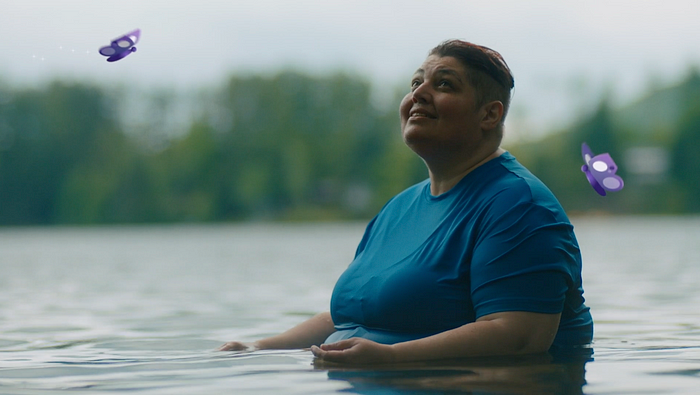5 Questions With… Zen Pace
The director of META’s latest Metaverse spot talks to FTW about sharing your authentic self
By FTW Staff

With the Metaverse quickly becoming an exciting new space in the digital world, FREE THE WORK creator Zen Pace asks the question, “what if we felt safer in our bodies in VR, and how would that make our reality brighter?”
Zen is a nonbinary filmmaker originally from Flint, Michigan. Raw, empathetic, and deeply personal, their filmmaking elevates vulnerable stories that speak to universal truths. Working with the women-owned production company, FIVE FATHOMS, Zen directed a spot that illuminates the joys of being true to yourself.
For Zen, it was especially important to create a piece that could include the magical feelings we have when we feel true to ourselves. With a culture that craves authenticity, how do you portray those parts of yourself?
What initially attracted you to working on “Be You”?
So many things! I think about identity a lot and how we shape our own. Like, for me, I think of my identity as an amalgamation of many smaller identities I have formed since childhood and now, as I get older, I’m rooting out the ones that no longer serve me to find my truest most authentic self.
When I saw the Meta Creative Director’s deck on this piece I fell in love with the Horizon World’s creators that we feature in this spot. Both are transgender people who’ve had a difficult life yet found healing in stepping into their truest form, and virtual reality helped with that. The divide between the digital and real-world is constantly thinning and informing the other, and for these two trans creators that meant their VR experience was having real positive life implications. To feel more whole in VR. To feel seen and safe, because of the limitations of our real bodies. It’s deeply important and powerful how technology can actually help us and challenge the white cisgender heteronormativity that is our default programming.
“My art is just multiple recreations and confessions at finding my own sense of pure truth.”
What are some ways in which your lived experience has shaped your way of seeing the world? How does that show up in your work?
The most important thing for me in my work is for the audience to feel something. For me, we are in the art of generating emotions and at times, helping others unravel parts of their identity they might have not known were there. Film is magic in this way. The importance of having audiences feel something, rather than just making something pretty, is important in my work because for a long time in my alcoholism I felt nothing. Everything was superficial. And before sobriety, I was also always questioning my identity and feeling forced to label myself as a “man” which was a lie that hurt my soul. So when I understood my identity as being nonbinary, I felt euphoric. That clarity translates into my work, whether it be helping a subject in a doc connect to their own truths or asking the right questions to actors from my own lived experience. My art is just multiple recreations and confessions at finding my own sense of pure truth.

What creators or films [or TV, or other fields] have had the biggest impact on your creative vision and practice?
So I was YOUNG when I saw American Psycho. And I remember watching that film and being mesmerized by the direction from Mary Harron. The film, directed by a woman, was absurd and problematic, yet it resonated with me because it showed the insidious horror and absurdity that comes with our selfish desires as a part of this capitalistic system. I generated so many complex feelings for this tiny little child. I became obsessed with what film can do.
Other pieces would be the equally insane and heartfelt nature of Metal Gear Solid which has always had a huge impact on me. Video Games in general have some of the best stories I’ve seen. Of course Miyazaki, specifically Princess Mononoke. That to me is a perfect film and incredibly powerful in its philosophical outlook. Kurosawa, Villeneuve, Julia Ducournau, too many sources of inspiration to mention.
What’s a past project that challenged you in a unique way? What’s a past project you’re most proud of? They can be the same one!
FRAUD definitely challenged me. As a director, you have to play multiple roles, especially on indie projects. So I was putting on my AD hat just as quickly as I was putting on my friend/pseudo-therapist hat. Juggling so many things might seem frustrating to some, but I realized that the stress we find ourselves in during films is something I relish. They are painful problems that are solvable and it feels amazing when we do. And I’m very proud of all of my films in different ways.
What advice would you give a younger version of yourself, navigating through earlier parts of your career? OR What’s one key piece of advice you would give to directors who are getting their start in today’s industry?
The advice I’d give myself is to care less about what others think. You’re on your own journey and your voice is inside you, NOT on Instagram. Not in other people’s work. It doesn’t matter and it’s a waste of time. Most people are replicating something they saw in hopes of achieving the same level of success that a prior piece of art made. Don’t do that. Stay close to your inner child and listen to them. They know what you wanna see on the screen.
“Be You” is currently available online. It was produced by women-owned and led creative production company FIVE FATHOMS. The cinematography was created by Steve McCord. Creative Director at Meta is Mike Ruiz and Meta Producer is Emily Richards.
Connect with FREE THE WORK by following us on Instagram, LinkedIn, and Twitter.
